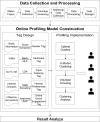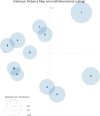Online profiling of volunteers in public health emergencies: insights from COVID-19 in China
- PMID: 39833777
- PMCID: PMC11744825
- DOI: 10.1186/s12889-025-21446-8
Online profiling of volunteers in public health emergencies: insights from COVID-19 in China
Abstract
Background: During public health emergencies, the diverse backgrounds of volunteers pose numerous management challenges. This study aims to develop an online profiling model of volunteers using social media data to achieve a more comprehensive and objective understanding of them.
Methods: In the proposed model, the study designed five profiling tags: basic information, sentiment, topic features, interest preferences, and online social engagement. K-Modes clustering was employed to implement the profiling. To validate the feasibility of the model, an empirical study was conducted using Weibo data from 1,070 volunteers during the COVID-19 pandemic in China, resulting in the online profiling of these volunteers.
Results: Four categories of volunteers could be identified: Public Affairs Pioneers (32.4%), Diary Record Lurkers (32.8%), Social Topic Sharers (20.9%), and Fashion and Entertainment Influencers (13.9%). Overall, volunteers were predominantly female, generally interested in entertainment, relatively satisfied with their volunteer work, and possessed a sense of social responsibility. The four categories of volunteers exhibited distinct characteristics in terms of interests, online social behavior, and influence.
Conclusions: The proposed online profiling model objectively captures the characteristics of volunteers during public health emergencies. The four volunteer categories identified through the empirical results provide a multidimensional and comprehensive understanding of volunteers. For different volunteer categories, official agencies can tailor their recruitment, management, and training strategies to better suit the specific needs and strengths of the volunteers, thereby enhancing the effectiveness and efficiency of volunteer engagement and ensuring volunteers are well-prepared and supported in their roles.
Keywords: COVID-19; Online profiling; Public health emergencies; Social media; Volunteers; Weibo.
© 2025. The Author(s).
Conflict of interest statement
Declarations. Ethics approval and consent to participate: Not applicable. Consent for publication: Not applicable. Competing interests: The authors declare no competing interests.
Figures









Similar articles
-
Sentiment Analysis of Texts on Public Health Emergencies Based on Social Media Data Mining.Comput Math Methods Med. 2022 Aug 9;2022:3964473. doi: 10.1155/2022/3964473. eCollection 2022. Comput Math Methods Med. 2022. PMID: 35983529 Free PMC article.
-
Insight into public sentiment and demand in China's public health emergency response: a weibo data analysis.BMC Public Health. 2025 Apr 10;25(1):1349. doi: 10.1186/s12889-025-22553-2. BMC Public Health. 2025. PMID: 40211194 Free PMC article.
-
Chinese Public Attitudes and Opinions on Health Policies During Public Health Emergencies: Sentiment and Topic Analysis.J Med Internet Res. 2024 Oct 28;26:e58518. doi: 10.2196/58518. J Med Internet Res. 2024. PMID: 39466313 Free PMC article.
-
#WuhanDiary and #WuhanLockdown: gendered posting patterns and behaviours on Weibo during the COVID-19 pandemic.BMJ Glob Health. 2022 Apr;7(4):e008149. doi: 10.1136/bmjgh-2021-008149. BMJ Glob Health. 2022. PMID: 35414567 Free PMC article. Review.
-
Prevalence of Health Misinformation on Social Media-Challenges and Mitigation Before, During, and Beyond the COVID-19 Pandemic: Scoping Literature Review.J Med Internet Res. 2024 Aug 19;26:e38786. doi: 10.2196/38786. J Med Internet Res. 2024. PMID: 39159456 Free PMC article.
References
-
- Albreht T. Challenges to global health emerging from the COVID-19 pandemic. Sustainability. 2023;15:7633.
MeSH terms
Grants and funding
LinkOut - more resources
Full Text Sources
Medical

